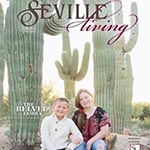The holiday season... a wonderful time to spend with those you love, party hardy, and be in an all-around great mood. The palm trees are alive with holiday lights (being from the east coast this always throws me) and if you pass through the Estados community in Seville, the professionally hung light shows are just beautiful. Not that yours don't look nice... it's easier when you have a lift to get at those high places and someone else to do it! It's a time to let go of stress, concentrate on things we are thankful for, and just an all-around feeling of good will.
It's also a time of year to think about those who may not be as fortunate as some of us are, and to share in good will and gifts. For Chanukah, we light candles and exchange gifts for 8 days- a bonanza for my grandson. December is a time for giving, all month long. Bigger than packaged gifts, money is also nice! The transfer of money in small amounts is easy to give, however, larger gifts do have some rules attached to them. While you may think "who will know" the long-term ramifications of gifting can be a dangerous thing if not done right. The annual gift exclusion, the amount each of us can gift to as many people as we want is $14,000, $15,000 for 2018. This means you can give a tax-free gift up to that amount, twice if the givers are husband and wife. If you choose to gift or transfer a larger amount you may with no payable taxable events as your accountant would credit those gifts against your lifetime amount, up to $5.49 million in 2017, and upped to $11.2 million for 2018- I hope you have this problem. Essentially, as long as you gift less than the lifetime amount, your gifts are tax free to you- yes, you. All the receiver has to do is say thank you- your job as the giver is to pay the gift tax if you exceed the lifetime limit.
You may gift stocks and bonds as well. A common estate planning technique is to transfer the ownership of a real estate asset, commonly used with elderly parents during Medicare planning. The parents' house is transferred to the children's name or into a trust (just an example- see your planner for specific advice) to protect the asset. While there are many ramifications to this strategy, the one thing I bring to your attention in this scenario is this: If you accept, or the trust accepts the house ownership, you also accept your parents cost basis. If they paid $35,000 for the $500,000 house in today's market, the capital gains treatment is applicable for the gain of $465,000. The recipient of the gift also accepts the original cost basis for taxable reasons- something to consider. The same is true for gifted stocks and bonds. There is no limit for spousal gifts, and all gift taxes are not deductible for income purposes.
Many persons make gifts or bequests to charitable organization for a variety of reasons: compassion, religious or spiritual commitments, support of the arts or other sciences and a desire to share a good fortune, if you are the beneficiary of such. Whatever the reason, US Tax law is designed to encourage these types of gifts. Gifting is a wonderful thing, a time where the person gifting frequently feels better than the beneficiary. All situations are different and I encourage you to both gift freely and consult your tax advisor. December is truly a time of giving... now if someone would only gift me 50 more yards on my drive... see you on the tee!







